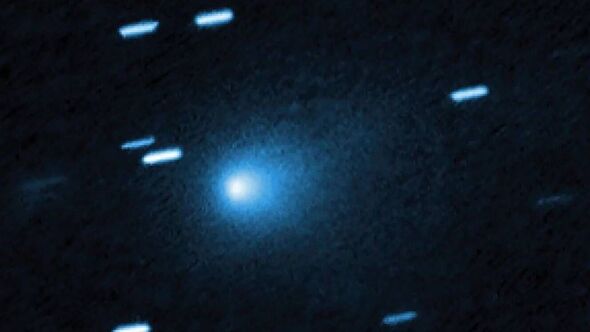Science
NASA Scientist Explores Possibility of Life on Dwarf Planet Ceres

A NASA scientist has raised intriguing possibilities regarding the existence of life on the dwarf planet Ceres, suggesting that astrobiologists are continually astonished by discoveries in the outer solar system. According to Dr. David Grinspoon, the exploration of Ceres, classified as a dwarf planet due to its sufficient mass to be shaped by gravity, indicates that it may still harbor conditions suitable for life.
Recent missions to Ceres have produced results that surpass initial expectations, unveiling features that suggest the presence of liquid water beneath its surface. In an interview with WIRED, Grinspoon noted, “Recently we sent a spacecraft there and we found some surprising things.” One of the most compelling findings includes a bright white flash on the planet’s surface, indicative of salt deposits, which implies that liquid water may have existed on Ceres, possibly resembling the salty composition found in Earth’s oceans.
Discoveries of Salt Deposits Spark Excitement
Grinspoon elaborated on the significance of these findings, stating, “The most interesting thing was a crater and what we found is that it is a salt deposit and that salt deposit indicates that there was water on the planet.” This evidence leads researchers to theorize that Ceres was once a “water world” and may still contain liquid water in its interior. The implications of this are profound for astrobiologists, who see Ceres and similar dwarf planets as potential sites for past or even present habitable conditions.
The excitement surrounding Ceres does not stop there. Grinspoon suggested the possibility that life-sustaining conditions could still exist on the planet. “Who knows, maybe at present some of these planets still have habitable oceans,” he remarked. This optimism reflects a broader trend among scientists, who are increasingly surprised by their findings in space exploration.
Revolutionizing Our Understanding of the Solar System
Ceres, the largest object in the asteroid belt located between Mars and Jupiter, has long puzzled scientists with its “alien mystery lights,” a term coined for the unusual illuminations observed on its surface. These lights have now been identified as salt deposits, further reinforcing the idea that Ceres may have once supported life.
Grinspoon emphasized the crucial role of water in the search for extraterrestrial life, stating, “Scientists have determined water is a prerequisite for life.” He also mentioned that experiments demonstrate how the building blocks of life are relatively easy to generate. The findings from Ceres not only enhance our understanding of this dwarf planet but also enrich our overall comprehension of planetary activity within our solar system.
As exploration efforts continue, the scientific community remains eager to unravel the mysteries of Ceres and beyond. The ongoing discoveries challenge preconceived notions about lifelessness in the solar system, suggesting that even seemingly desolate worlds may hold the key to understanding life’s potential in the cosmos.
-

 Health3 months ago
Health3 months agoNeurologist Warns Excessive Use of Supplements Can Harm Brain
-

 Health3 months ago
Health3 months agoFiona Phillips’ Husband Shares Heartfelt Update on Her Alzheimer’s Journey
-

 Science1 month ago
Science1 month agoBrian Cox Addresses Claims of Alien Probe in 3I/ATLAS Discovery
-

 Science1 month ago
Science1 month agoNASA Investigates Unusual Comet 3I/ATLAS; New Findings Emerge
-

 Science4 weeks ago
Science4 weeks agoScientists Examine 3I/ATLAS: Alien Artifact or Cosmic Oddity?
-

 Entertainment4 months ago
Entertainment4 months agoKerry Katona Discusses Future Baby Plans and Brian McFadden’s Wedding
-

 Science4 weeks ago
Science4 weeks agoNASA Investigates Speedy Object 3I/ATLAS, Sparking Speculation
-

 Entertainment4 months ago
Entertainment4 months agoEmmerdale Faces Tension as Dylan and April’s Lives Hang in the Balance
-

 World3 months ago
World3 months agoCole Palmer’s Cryptic Message to Kobbie Mainoo Following Loan Talks
-

 Science4 weeks ago
Science4 weeks agoNASA Scientists Explore Origins of 3I/ATLAS, a Fast-Moving Visitor
-

 Entertainment4 months ago
Entertainment4 months agoLove Island Star Toni Laite’s Mother Expresses Disappointment Over Coupling Decision
-

 Entertainment3 months ago
Entertainment3 months agoMajor Cast Changes at Coronation Street: Exits and Returns in 2025









